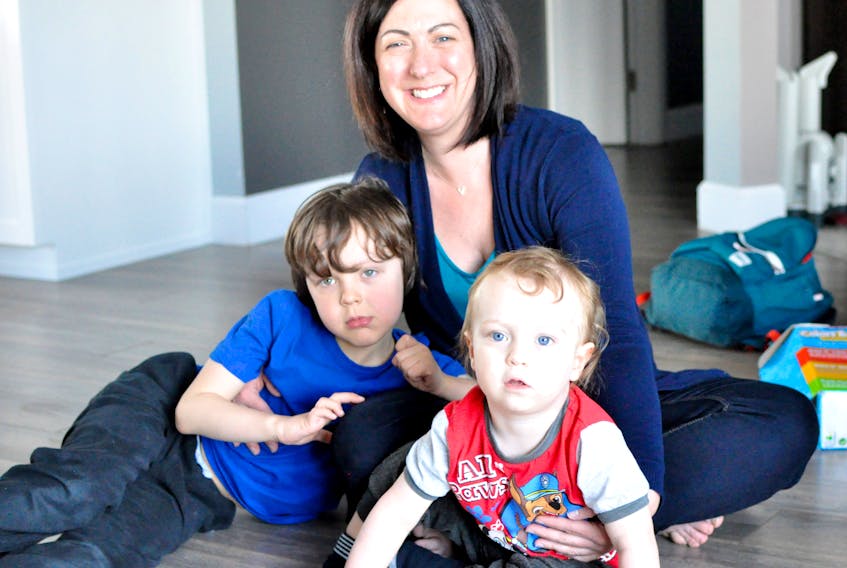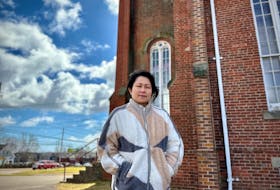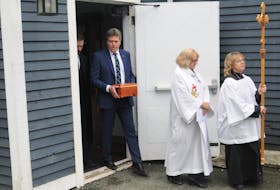Those first couple weeks after giving birth can be emotionally trying for a mom and result in them feeling sad, impatient, irritable, restless and anxious.
It’s known as the baby blues, and it can start four or five days after birth and last a couple of weeks.
For some mom’s those baby blues don’t pass and turn into more serious forms of postpartum depression.
Deirdre Andrews is a Corner Brook mom who during Mental Health Week is sharing her story of postpartum depression and anxiety as she strives to help other moms.
Andrews and her husband, Justin White, have two sons, six-year-old Rylan and two-year-old Isaac.
After having Rylan, Andrews’ postpartum depression went undiagnosed for about nine and half months.
The diagnosis came Andrews ended up in the emergency department of Western Memorial Regional Hospital.
She had seen a counsellor a few times, but on that day her mental state caused her counsellor to cancel all her appoints and bring her to the hospital.
“Because I was suicidal.”
She remembers being asked at the time if she had anything to live for.
“And my answer was my son. And that was enough to trigger me to say I really need help.”
Andrews said she always had anxiety, but didn’t really know that.
“And so, with complete exhaustion, and (being) overwhelmed and with having a newborn over time my anxiety escalated into what’s known as obsession compulsive disorder (OCD) with intrusive thoughts.”
It’s still an anxiety, but instead of the rituals common with OCD, it was a thought process that involved scary and gruesome thoughts.
“And when it comes to mothers who have intrusive thoughts it’s usually about harm coming to their child,” she said.
For some it’s harm coming from outside sources and for others it’s that they might hurt their children.
For Andrews it was the first, she was scared all the time that something would happen to Rylan.
She doesn’t mind talking about the thoughts, but doesn’t want them written, as it’s a slow process of breaking the stigma associated with mental illness.
“It was continuous reel in my head that never ever ended. Not even during sleep,” she said.
And by then she didn’t the mental capacity to realize that she had to stop these thoughts.
She thought suicide was the only way out.
“When someone is in the depths of depression all they’re thinking is I need to escape this pain.”
When mothers have these intrusive thoughts, she said there’s a lot shame involved in them and you’re scared to tell anyone because you’re scared that they might be real.
“So, what ends up happening is when you actually talk to a medical professional they’ll explain to you that the fact that you’re scared of these thoughts means almost 100 per cent that you will not act on them, if they’re harm, or that they won’t happen.”
Andrews wasn’t hospitalized, but did have a psychiatric consult, which she said was a blessing.
“Because it was the first time anybody had ever put a name on what was going on.”
She was put on medication for her illness and after six years said dealing with it is still a work in progress, as after Isaac was born it happened again.
Her fear of not making it is was what caused her to wait four years before having another child.
She started talking about her illness after she was diagnosed and since Isaac was born she decided she had to do something to help other mothers.
“Because if I had had someone be so open with me, like I can be open with other mothers, after I had my first son it never would have escalated to the point where I went nine and half months.”
Last summer she put a post on Facebook to see if there were other mothers out there who wanted to talk about the reality of motherhood and anxiety and postpartum mood disorders.
She connected with about five women and held a few meetings in her living room.
It went on for a little while, but she had to step back because of her anxiety and mental health.
This past November when a friend sent her a link for a grant application for the Community Addictions Prevention and Mental Health Promotion Fund.
The fund is an initiative of the Department of Health and Community Services and administered by the four regional health authorities.
She sent in the application in December and received notification in April that she’d been awarded $3,000 to start the Postpartum Mother’s Wellness Support Group.
With help from a few other mothers she’s getting things in place with an aim to start holding meetings in September.
The plan is to alternate meetings with information and discussion on topics related to mothers’ mental health and self-care activities like yoga, meditation and nutrition. It will all be at no cost to the participants.
“I want to offer a safe space for mom’s to just be really, really open and be able to say exactly what’s on their mind without any kind of judgement.”
Anyone interested in finding more information about the group can reach out to Andrews through Facebook messenger.









